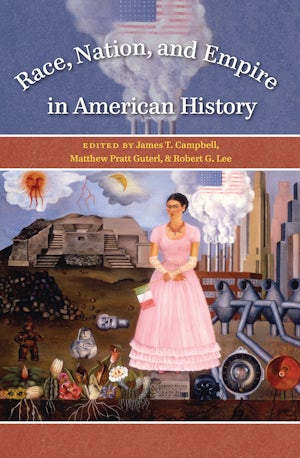Race, Nation, and Empire in American History
Edited by James T. Campbell, Matthew Pratt Guterl, Robert G. Lee
392 pp., 6.125 x 9.25, notes, index
-
Paperback ISBN: 978-0-8078-5828-8
Published: September 2007 -
E-book EPUB ISBN: 978-0-8078-7275-8
Published: December 2017 -
E-book PDF ISBN: 979-8-8908-7927-1
Published: December 2017
Buy this Book
- Paperback $37.50
- E-Book $27.99
In fifteen essays, distinguished historians examine the central role of empire in American race relations, nationalism, and foreign policy from the founding of the United States to the twenty-first century. The essays trace the global expansion of American merchant capital, the rise of an evangelical Christian mission movement, the dispossession and historical erasure of indigenous peoples, the birth of new identities, and the continuous struggles over the place of darker-skinned peoples in a settler society that still fundamentally imagines itself as white. Full of transnational connections and cross-pollinations, of people appearing in unexpected places, the essays are also stories of people being put, quite literally, in their place by the bitter struggles over the boundaries of race and nation. Collectively, these essays demonstrate that the seemingly contradictory processes of boundary crossing and boundary making are and always have been intertwined.
Contributors:
James T. Campbell, Brown University
Ruth Feldstein, Rutgers University-Newark
Kevin K. Gaines, University of Michigan
Matt Garcia, Brown University
Matthew Pratt Guterl, Indiana University
George Hutchinson, Indiana University
Matthew Frye Jacobson, Yale University
Prema Kurien, Syracuse University
Robert G. Lee, Brown University
Eric Love, University of Colorado, Boulder
Melani McAlister, George Washington University
Joanne Pope Melish, University of Kentucky
Louise M. Newman, University of Florida
Vernon J. Williams Jr., Indiana University
Natasha Zaretsky, Southern Illinois University Carbondale
About the Authors
James T. Campbell is professor of American civilization, Africana studies, and history at Brown University. Robert G. Lee is associate professor of American civilization at Brown University.
For more information about James T. Campbell, visit
the
Author
Page.
Matthew Pratt Guterl is director of the American studies program and associate professor of African American and African diaspora studies at Indiana University.
For more information about Matthew Pratt Guterl, visit
the
Author
Page.
Robert G. Lee is associate professor of American civilization at Brown University.
For more information about Robert G. Lee, visit
the
Author
Page.
Reviews
"Offer[s] something new, important, and exciting. Should be read cover to cover. Fascinating introduction. . . . Presents new models for collaboration and the final product is a wild and wonderful ride."--Journal of American History
"[A] diverse collection of essays."--CLIO
"A strong addition to the libraries of historians on race, empire, nation formation, gender, and diaspora studies."--Journal of American Ethnic History
"The essays are without exception lucidly written, engaging, and critical yet empathetic. . . . [An] impressive collection."--Journal of Southern History
"Focusing on race and deploying a capacious notion of empire that ranges from formal empire to individual and collective transnational experiences, these quite imaginative and diverse essays open up many new and important avenues for understanding the workings of race, the meanings of American nationalism, and the dimensions of empire."--Thomas Bender, New York University
"The contributors to this volume analyze the entanglements of race, nation, and empire through scrupulously close readings of texts and artifacts as well as through intensive historiographical analyses of cultural contexts. They convincingly demonstrate how economic, political, and military expansionism went hand in hand with the rise of the nation-state, making empire a constitutive feature of global modernity."--Donald E. Pease, Dartmouth College, coeditor of Cultures of U.S. Imperialism

